The ways in which the economy never recovered from 2008
The headline economic numbers are far better now than in 2008-2009. The unemployment rate, the GDP, the national deficit, the stock market, etc. have all improved.
Yet many of us can't shake the feeling that things are still stuck in 2008. Well, you aren't crazy.
Many areas of the economy have never recovered from the 2008, and some are even worse today.
Does this mean things aren't better than in 2008? No. But it does mean that most comparisons between this "recovery" and recoveries in the past are flawed. This one is different.
Child Poverty
What sort of recovery has Increasing numbers of children in poverty?
There are nearly two million more children living in poverty in the U.S. today than during the 2008 recession, shocking new figures reveal.
Nearly a quarter of youngsters (22 per cent, or around 18.7million children) - were classed as living below the poverty line in 2013.
This has risen from 18 per cent in 2008 (16million youngsters), according to the Casey Foundation's 2015 Kids Count Data Book.
The rate for black children is a whopping 38%. The overall poverty rate is down from 2012, but still higher than 2008.
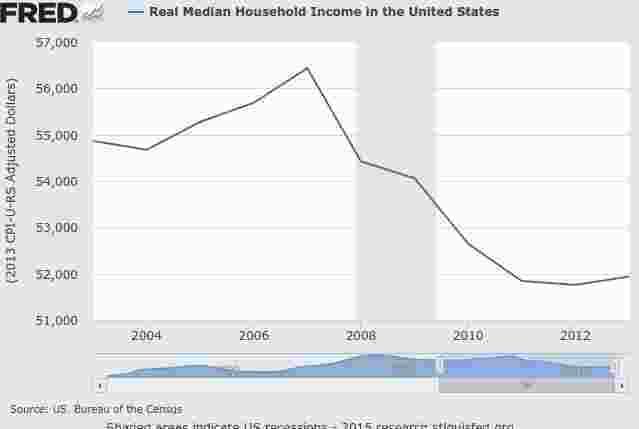
Household Income
Almost every month Wall Street is surprised by the fact that household incomes aren't bouncing back from the recession. This "new normal" has led to a decline in the middle class.
In the late 1960s, more than half of the households in the United States were squarely in the middle, earning, in today’s dollars, $35,000 to $100,000 a year. Few people noticed or cared as the size of that group began to fall, because the shift was primarily caused by more Americans climbing the economic ladder into upper-income brackets.
But since 2000, the middle-class share of households has continued to narrow, the main reason being that more people have fallen to the bottom.

Since 2008, the number of Americans who view themselves as middle class has dropped from 53% to 44%, with the largest drop between 2012 and 2014. There is a similar increase in the number of people who view themselves as lower class.
Much of this can be seen in the 50% growth of temporary workers.
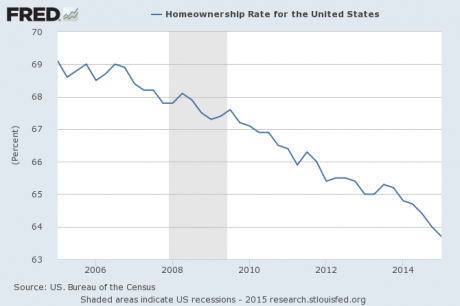
Homeownership
The subprime housing bubble burst years ago, but the homeownership crisis is still playing out.
The U.S. homeownership rate continued to decline in 2015, hitting its lowest level since 1989.
The seasonally adjusted homeownership rate declined to 63.8% in the first quarter of 2015 compared with 65% in the first quarter of 2014, according to estimates published by the Commerce Department on Tuesday.
The declining trend hasn't moderated at all, and we've long since retraced the housing bubble.
New Businesses
Fewer and fewer Americans are starting small businesses. In fact, more are going out of business than starting businesses.
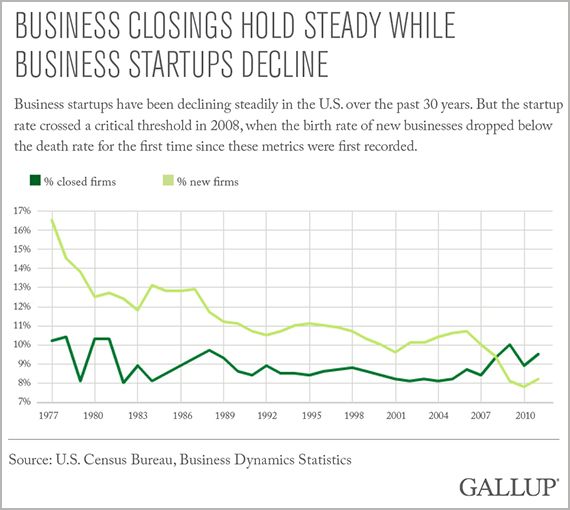
What's more, this trend is especially pronounced in school-debt burdended millenials.
"Saddled with student loan debt, millennials can't afford to be entrepreneurs," according to 2015 state of entrepreneurship report from the Kauffman Foundation, a nonprofit devoted to studying entrepreneurship.
Start-up rates among Americans ages 20 to 34 peaked at 35 percent in 1996 and has since declined to 23 percent in 2013, according to Kauffman.
Lack of personal savings and difficulty at getting financing are the primary reasons.
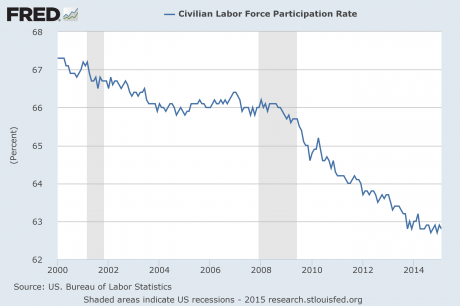
Labor Force Participation
Many people have commented on the drop of people in the workforce, the primary reason for the drop in the unemployment rate, and most of it is because of demographics (i.e. Baby Boomers retiring). However, not all of it is because of demographics.
The US labor force participation rate has fallen by about three percentage points since the Great Recession. Of that decline, Barclays thinks two points are due to population aging. The rest it blames on less participation within various age groups. Now overall, the US still has participation rates higher than Germany, Japan, and UK — the other large, advanced economies Barclays examines in a new report. But US participation dropped a lot more than those nations between 2005 and 2014. And it has particularly dropped a lot for working-age Americans versus that age group in other nations.
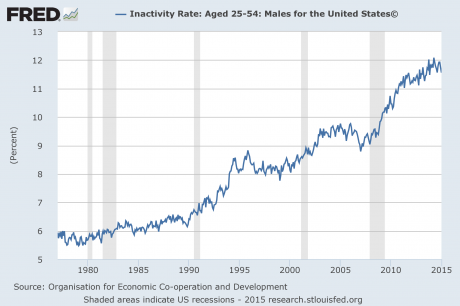
If people were dropping out of the workforce because they were getting wealthy then we shouldn't care about this. But that is obviously not the case. In contrast, the participation rate of older workers has dramatically increased.
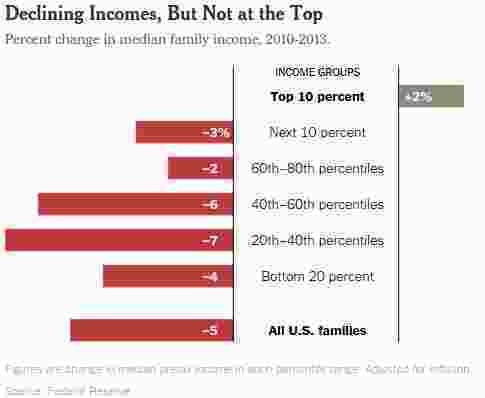
Wealth Inequality
Not surprisingly, wealth inequality just keeps getting worse.
Before the impact of tax and spending policies is taken into account, income inequality in the United States is no worse than in most developed countries and is even a bit below levels in Britain and, by some measures, Germany.
However, once the effect of government programs is included in the calculations, the United States emerges on top of the inequality heap.
That’s because our taxes, while progressive, are low by international standards and our social welfare programs — ranging from unemployment benefits to disability insurance to retirement payments — are consequently less generous.
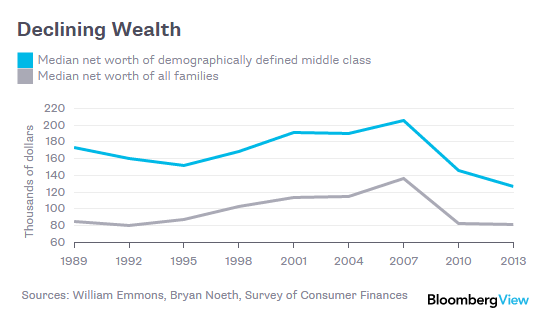
America's inequality problem has entrenched the lack of social mobility. This gets justified by the "Horatio Alger myth".


Comments
Don't worry
Once Hillary is elected, everything will be better.
Here's her energy plan
!. Moving the economy along “a path towards deep decarbonization by 2050”
2. Providing “enough clean renewable energy to power every home in America” by 2027
3. 500 million solar panels installed by the end her term if she’s elected president
4. Hike solar capacity to 140 gigawatts by the end of 2020
5. Add more power generation from other renewable sources, like wind and geothermal
6. Extending federal clean energy tax incentives
7. Defend the Obama Clean Power Plan
8. Cut greenhouse gases from power plants
9. Launch a “Clean Energy Challenge” that would award competitive grants and other state incentives
10. Reduce oil consumption
11. Modernize the nation’s energy infrastructure
12. improve building efficiency
13. Protect the health and retirement security of coal miners
Plus, I'm pretty sure that she will then go after the bankers (the pumping money into her campaign)
and then everyone will be better off equality wise.
Because she will stop the bogus war on terror so that we won't be spending trillions fighting the people who are no threat to us and put the money back into the social programs that the GOP gutted to help pay for the wars.
After that, everyone will live happily ever after.
If ICE were hunting down Trump’s critics, that would be bad but would make sense.
But ICE is hunting down Israel’s critics.
As long a President Hillary
…can do those things without the assistance and funding of Congress, it sounds like a sane plan. If the US Congress remains moribund and paralyzed, oh well….
In any event, I worked on the predictive technologies involved in revealing the next President (eighteen months in advance). If Hillary is alive and runs — she will win.
That prediction holds as long as she is in the race.
Is this snark?
I'm not sure whether I should take this comment seriously or not.
You might have missed this
After that, everyone will live happily ever after.
If ICE were hunting down Trump’s critics, that would be bad but would make sense.
But ICE is hunting down Israel’s critics.
I say this with genuine respect and admiration for your work
and in particular this most excellent diary: Please, please don't make this like teh GOS where snark tags are de riguer. Besides, you, me, and the lamp post know she will do absolutely none of these things. She is a Washington consensus kind of gal after all.
(And apologies should anyone here find the term "gal" offensive -- the only person I intend to offend isHer Nibs.)
"Our society is run by insane people for insane objectives. I think we're being run by maniacs for maniacal ends and I think I'm liable to be put away as insane for expressing that. That's what's insane about it."
-- John Lennon
LOL
I am not offended. Signed sincerely, gulfgal98.
Do I hear the sound of guillotines being constructed?
“Those who make peaceful revolution impossible will make violent revolution inevitable." ~ President John F. Kennedy
No problem
I get it, but as Jon Stewart would say, "It was a very long walk for a punchline."
Those are the metrics
…that I see, day in day out, gjohnsit. Perhaps that's what the "normal" US economy looks like, these days.
Meanwhile, there's another metric that should not be overlooked — consumer spending and exports.
1. The strong dollar is crashing international sales for US corporations. Apple, for example.
2. Americans cannot afford to consume/support the domestic retail markets.
(Of course, this does not mean that the losses will affect the stock market, which is completely disconnected from the US economy.)
It's the "new normal" that keeps getting dusted off, renewed,
and amped up with each recession.
Lather. Rinse. Repeat.
"Our society is run by insane people for insane objectives. I think we're being run by maniacs for maniacal ends and I think I'm liable to be put away as insane for expressing that. That's what's insane about it."
-- John Lennon
This only confirms what I've been thinking for a long time,...
that workers, particularly those at the bottom of the pay scale and socioeconomic ladder have never recovered from the Volcker recession. In fact each fresh new recession flings more fecal matter of misery their way. And the only solutions tendered by both parties either exacerbate the situation or act act like a very minor palliative (sort of like giving a Tylenol to a cancer patient).
"Our society is run by insane people for insane objectives. I think we're being run by maniacs for maniacal ends and I think I'm liable to be put away as insane for expressing that. That's what's insane about it."
-- John Lennon
Speaking of Volcker,
I occasionally put a quote from him in my sig line at Dkos,
Mollie
"The best and most beautiful things in the world cannot be seen or even touched. They must be felt with the heart."--Helen Keller
Everyone thinks they have the best dog, and none of them are wrong.